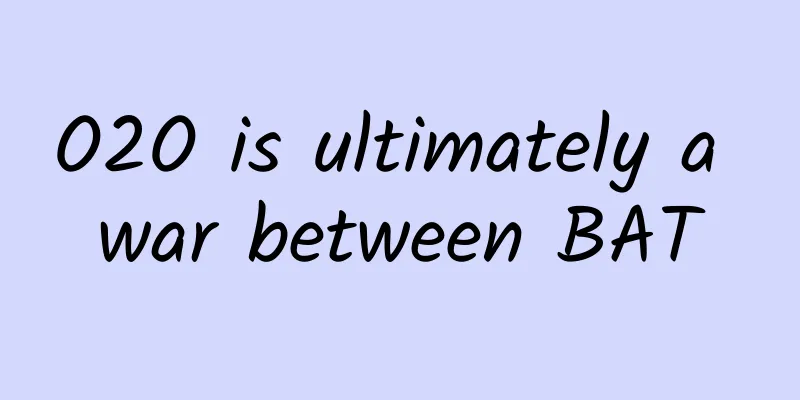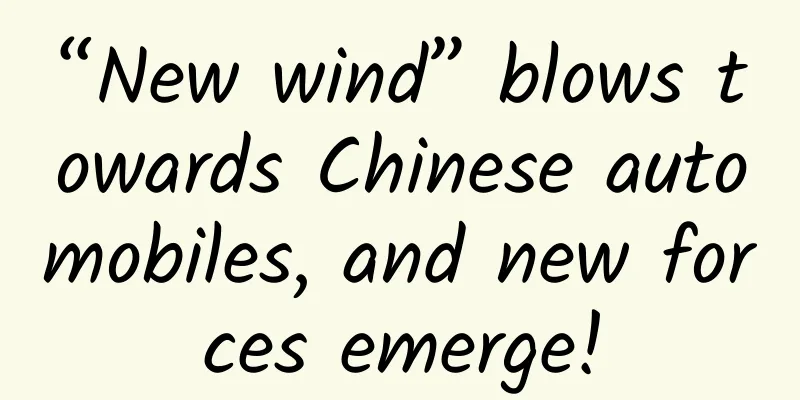O2O is ultimately a war between BAT

|
Some people say that the National Day Golden Week is a microcosm of the O2O war with Chinese characteristics. This year, in Beijing, a battleground for China's Internet, the protagonists of O2O appeared in addition to traditional group buying service providers such as Meituan, Dianping, and Nuomi. During the National Day holiday, from north to south, we visited the Wudaokou, Haidian and Asian Games Village business districts, and then from west to east, through the core business districts of Beijing such as Wukesong, Qianmen, Dongsi, Xidan and Guijie. Alipay's branded ads, Tencent WeChat Pay, and mobile Baidu in-store scan code discounts can be seen almost everywhere. BAT, the three traditional Chinese Internet giants, have stepped from the backstage to the front stage and personally participated in the O2O war. The in-store scan code payment service launched by Alibaba and Baidu has gained rapid momentum and has in fact played the role of a disruptor of traditional group buying. In traditional group buying, users need to pay in advance and price is often the only decision-making criterion. As a result, merchants are not motivated enough and are prone to discriminate against users when consuming, which harms the user experience. For users, it is extremely convenient to scan the code and pay in store. Each of the BAT companies has hundreds of millions of users - almost every consumer has Baidu, WeChat and Alipay installed on their mobile phones. Therefore, as long as any merchant has the service of paying in store, users can easily complete the payment and enjoy the discount by opening the application of any BAT company. Scan the QR code to pay in the store, BAT, has become the new synonym for the fierce competition in the O2O field during the National Day holiday. No matter how much China's largest group buying website Meituan wants to remain independent - it even offends its early investor Alibaba for this, it may have to accept the fact that the life service O2O war is not its war, but the war of the BAT super players. Money-burning business The experience of Groupon, the master of Meituan, has proved one thing: a business model based on group buying is difficult to become an independent business. The company was once a darling of the capital market, but its market value has evaporated by nearly 90% since its listing, and now only has about 2.4 billion US dollars. Similarly in the United States, the market value of another well-known O2O company Yelp has also evaporated by 80%, leaving only a few billion US dollars. Dianping's model is to imitate Yelp. It is generally believed that the high labor cost of the group-buying model is a major flaw. In fact, it is a money-burning competition. Without loyalty, it cannot form competitiveness. At the same time, it cannot form an effective first-mover advantage, such as scale effect, to resist the competition of latecomers. Such a structure is doomed to have no hope of profitability. Looking at the current commission rate is enough to illustrate the problem - it has dropped to 2% or even lower, and may be close to zero in the future, which will severely suppress Meituan's revenue (not to mention profit) space. On the contrary, BAT, because they have strong capital, massive users, mature commercial monetization system, and layout in 3,600 industries, they enjoy unique advantages in cost sharing and cross-monetization. Take Alibaba as an example. It has hundreds of millions of active users based on transaction habits. These users are also O2O users, which will provide cross-selling opportunities. Its layout in the fields of medicine, culture, etc. is something that Meituan does not have. Another example is Baidu, which not only has multiple super portals, but also has a huge advantage in the map segment. With these advantages, Baidu quickly gained a good share and even a leading position in the fields that Meituan entered, such as travel, through Nuomi, Qunar, and Waimai. At the same time, it has also made layouts in the sub-sectors that Meituan has not entered, such as medicine, finance, and education. Consumers “vote with their feet” The battle of thousands of groups has caused a large number of group buying platforms to collapse. The biggest benefit is that it has educated consumers on how to choose the "discount" that they are most satisfied with before eating. However, the disadvantages of group buying have been exposed by the in-store payment. Consumers do not need to be limited to a few fixed dishes, and do not need to repeatedly verify the code. They only need to pay in the store and scan to enjoy the same or even higher "discount". After experiencing the big baptism of in-store payment during the National Day Golden Week, consumers may easily change their past consumption habits of group orders and even vouchers. Even in the group buying field where Meituan is strong, BAT is implementing subversion through new gameplay. This is why the three BAT companies will use WeChat scanning, Alipay scanning and mobile Baidu scanning to various business districts. This way of enjoying discounts by paying in the store avoids the tedious operations of customers calculating discounts in advance, snapping up group orders, and making up the zero, and there is no need to worry about the "face" problem. Why wouldn't users enjoy it? All this happened because neither users nor merchants have currently formed O2O entrance loyalty. Users value affordability and experience, while merchants value incremental revenue and returns. This means that no matter who you are, as long as you can meet their needs, you can attract them to your company, and BAT does not lack such resources. It’s no longer a group buying war Today's O2O war is indeed no longer a group buying war. What is even more obvious is that compared with the three professional O2O platforms, Meituan, Dianping and Nuomi, the daily active users are only around 10 million. In comparison, the daily active users of WeChat, Baidu Mobile and Alipay apps have already exceeded 100 million. In other words, whether you are dining at a restaurant, KTV, booking a hotel, or at a supermarket chain or a small store at your doorstep outside the Sixth Ring Road, you can always "scan" to enjoy discounts. The scale effect of BAT can stimulate and cultivate user habits in all aspects. Then, once the three powerful apps' in-store payment scanning is linked to consumption scenarios, it is not an exaggeration to stimulate the so-called trillion-dollar O2O volume. Alipay, WeChat Pay, and Baidu Wallet are not built overnight, and for a professional O2O platform like Meituan Dianping, rebuilding a payment system is a fantasy. What's worse is that due to its high frequency, mobility and user transaction attributes, life service O2O has immeasurable strategic value to any of the BAT companies. Whoever masters it may win the initiative to reconstruct the future Internet business landscape. In other words, they don't have to consider short-term profits at all. For startups like Meituan, this is destined to be a tragedy from the beginning. In the long run, O2O competition will rise to a battle between platforms (which may have already begun) and technology. The former is essentially a competition for ecological influence, while the latter is essentially the accumulation of talent and technology. In these two aspects, Meituan, which has been fighting alone, relying on external transfusions, and with various resources always stretched, will not be able to make real upfront investments. Therefore, even if it wins a good share in the early battle of scale, it will be at a disadvantage in the last two stages. Currently, in the field of O2O, although Tencent has invested in Dianping and Alibaba has invested in Meituan, the integration capabilities of both parties are very limited. In the field of O2O, the three giants BAT are making new layouts in another dimension of thinking in addition to loose structure investment: Alibaba is personally participating in the battle through Alipay, and Tencent is directly connecting merchants through WeChat official accounts and WeChat payment. Even Baidu, which has fully acquired Nuomi, is also doing full integration through Baidu Mobile and Baidu Wallet. Looking at O2O through the Golden Week, it is still a battle of Three Kingdoms, but the real players are no longer Meituan, Dianping and Nuomi, but those three, BAT. As a winner of Toutiao's Qingyun Plan and Baijiahao's Bai+ Plan, the 2019 Baidu Digital Author of the Year, the Baijiahao's Most Popular Author in the Technology Field, the 2019 Sogou Technology and Culture Author, and the 2021 Baijiahao Quarterly Influential Creator, he has won many awards, including the 2013 Sohu Best Industry Media Person, the 2015 China New Media Entrepreneurship Competition Beijing Third Place, the 2015 Guangmang Experience Award, the 2015 China New Media Entrepreneurship Competition Finals Third Place, and the 2018 Baidu Dynamic Annual Powerful Celebrity. |
<<: China Automobile Dealers Association: A brief analysis of Tesla's network layout in China
>>: GSMA: 2021 Asia Pacific Digital Society Report
Recommend
Poor copy conversion? You may have overlooked this.
I guess many copywriters have encountered the abo...
What is the real Ordos like?
Ordos In most people's impression It is a nor...
Change! Apple may spend 130 billion to develop cars and poach Tesla's factory in China?
[[327587]] As the mobile phone business gradually...
Data Brother Qianchuan practical online advanced course video
Data Brother Qianchuan practical online advanced ...
What is the future of e-sports anchors after gaining fame and fortune?
Not long ago, a King of Glory anchor revealed tha...
Spring is here, flowers are blooming, it’s time to go outings. How to take beautiful photos scientifically under the beautiful scenery
Have you been out taking photos recently? Spring ...
The four instructors of Dabohui's "Live Streaming Sales System Course from Beginner to Mastery" will help you master live streaming sales on Douyin
Contents: From entry to mastery of live streaming...
Tuberculosis, the forgotten plague
On March 24, 1882, German microbiologist Robert K...
Android MVP framework learning and practice
Preface I thought that Internet companies basical...
How much does it cost to create a daily necessities mini program in Xiaogan?
How much does it cost to create a daily necessiti...
Can the new version of Alipay revolutionize WeChat?
[[152224]] October 14th was my birthday in my zod...
Are the formaldehyde concentrations the same when the air is warm at 26 degrees in winter and cold at 26 degrees in summer?
Some time ago, we received a message from a fan f...
Aiti Tribe Stories (22): From fleeing from Beijing, Shanghai and Guangzhou to fleeing back to Beijing, Shanghai and Guangzhou
[51CTO.com original article] Sima Yu is Jiuge'...
Underground "sprint" success! my country drilled the first 10,000-meter deep well in the heart of the desert
At 14:48 on the 4th, as a diamond drill bit conti...
The soldier wiped his butt with its leaves and committed suicide due to the pain
Makes people and animals go crazy with pain The l...









